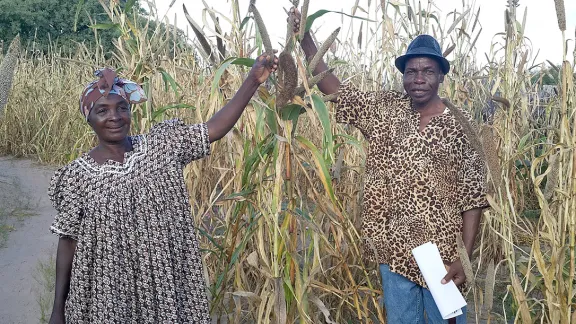
Jacob Alweendo and his wife Berfine are confident of a good millet harvest from their farm in Oipanda village, northwest Namibia. Photo:LWF/UCC-NELC
A year ago Sindimba Anafrida Mwengere and her family were suffering through Namibia’s worst drought in 30 years in their rural community of Gcwatjinga in the northern region of Rundu near the border with Angola.
At the height of the drought in the second half of mid-2013, the United Nations estimated that one in three people were at risk of malnutrition in the Southern African country. A state of emergency had been declared after widespread crop failure, lack of pastures and livestock deaths, in a country in which 30 percent of the 2.1 million people depend on subsistence farming.
The drought had a devastating effect on the Mwengere family livelihood and on the land that sustains them. They could not grow their own food and her husband had to emigrate to find work, and she and their six children aged one to 21 years did not have enough to eat.
Today, thanks to an emergency cash transfer program (CTP) involving a payout of 100 Namibian dollars (USD 10) per family member, which the community has gratefully dubbed Tumbutumbu meaning, “From Nothingness,” the family is planning for a brighter future.
Gratitude to LWF Churches for Support during Critical Drought Period
The Lutheran World Federation (LWF) member churches in Namibia and the LWF Department for World Service (DWS) jointly initiated the CTP, targeting nearly 5,000 families severely affected by the drought mainly in the country’s rural areas. Funding raised from the global Lutheran communion facilitated the drought response. The goal of the CTP was to enable the affected people to prioritize their most basic needs, and use the monthly grant provided from September 2013 to May 2014 to take care of their families during this critical period. The cash provided on a debit card of the service provider Nampost, was issued to the woman in the household. Families also received psychosocial support, training on emergency preparedness and advocacy.
Mwengere’s family received 700 Namibian dollars per month, which went to buying kitchen utensils, food, goats to boost their livestock and iron sheets to roof the house. They also paid school fees for the children.
Looking back, she says the cash grants allowed families flexibility in shaping their lives and building resilience for the future. Rains have returned since April, but it will take a long time for crop harvests to stabilize and for livestock recovery. “We have come a long way in a year, and we are not alone, thanks to the cash grant scheme,” she adds.
Mwengere’s family was among those interviewed by a monitoring team of the drought response implementers namely, the LWF and the United Church Council of Namibia Evangelical Lutheran Churches (UCC/NELC) comprising the Evangelical Lutheran Church in Namibia (ELCIN), Evangelical Lutheran Church in the Republic of Namibia (ELCRN) and the German-speaking Evangelical Lutheran Church in Namibia.
Effective and Efficient
Households interviewed indicated that all were grateful for the cash grants as an effective and efficient way of responding to the drought. “The responses to the cash grant were truly overwhelming and the impact very evident,” the initial impact monitoring report noted.
The monitoring process also revealed the importance of psychosocial support, including help from neighbors and opportunities to socialize. While faith affiliation is not criteria for LWF’s humanitarian intervention, some respondents also talked about the critical nature of faith in God and prayer.
“This is an element of great hope that despite the drought situation, life would eventually thrive,” the team noted.
In some regions most respondents said they were aware of the importance of emergency preparedness, while in other areas such planning was not yet a priority.
Hope and Pride, Despite Slow Recovery
While rains have returned and the situation has generally improved, the monitoring team learned that some isolated communities in the north such as Ongongo still lack basic social services including roads, health care, water and entrepreneurial opportunities, making recovery from the drought difficult.
The Alweendo family of Oipanda in the Onangholo region of northwestern Namibia would agree. During the drought, Jacob Alweendo and his wife Berfine could barely feed their family of ten as they could not grow their staple food mahangu (millet).
The children were malnourished, there was no grass for the animals and most water points were dry.
The cash grant scheme enabled the family to purchase food such as meat, maize meal, fish and milk, pay school fees, plough the millet field and access health care. In addition, the family managed to put some money aside for the future to reduce the risk of any future disaster.
“We are proud of our good millet harvest,” Alweendo says, adding the family is confident that this year’s harvest will last until the next season.
(Mr White Mwale, LWF/DWS sub-hub coordinator for Southern Africa, contributed to this story.)


